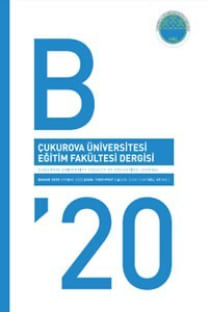Devlet ve Özel Okullarda Çalışan İngilizce Öğretmenlerinin Mesleki Gelişim Üzerine Algıları
Bu çalışma devlet ve özel okullarda çalışan İngilizce öğretmenlerinin mesleki gelişim üzerine algılarını araştırmaktadır. Çalışmanın amacı, mesleki gelişim kavramını değerlendirmek ve farklı okul tiplerinde çalışan farklı cinsiyet ve yaş gruplarından öğretmenlerin mesleki gelişime yönelik algılarına odaklanarak öğretmen gelişiminin güncel duruma ışık tutmaktır. Devlet okullarından 45, özel okullardan 45 İngilizce öğretmeni, mesleki gelişim ile ilgili Likert türü anketin nicel analiz için uygulandığı veri toplama sürecine katılmıştır. Sonuçlara göre çalışmaya katılan öğretmenlerin tümü mesleki gelişim ile ilgili konularda, özellikle yaşam boyu ve sürekli mesleki gelişim ve öğretmenlerin kendilerine ve mesleklerine olan inançları konularında olumlu algılamaya sahiptir. Ayrıca, özel okulda çalışan İngilizce öğretmenlerinin devlet okulunda çalışanlara göre mesleki gelişim ile ilgili bazı esasları daha çok önemsedikleri ortaya çıkmıştır. Öğretmenlerin yaş gruplarının mesleki gelişime yaklaşımda bir etkisi olmamakla beraber cinsiyet faktörü ve mesleki gelişim arasında kadın İngilizce öğretmenleri adına bir dereceye kadar fark ortaya çıkmaktadır
Turkish State and Private School EFL Teachers’ Perceptions on Professional Development
This study investigates the perceptions of state and private school EFL teachers towards professional development. It focuses on interpreting the concept of professional development, putting emphasis on different perceptions of teachers working in different types of schools as well as gender and age factors in order to shed light on the current concepts of teacher development. In the study, 45 state and 45 private school EFL teachers participated in data collection procedure in which a Likerttype questionnaire about professional development was conducted to carry out quantitative analysis. Results indicate that EFL teachers perceive professional development topics positively, especially life-long and ongoing professional development, self-belief and belief in the teaching profession. Besides, private school EFL teachers seem more concerned about some principles of professional development in teaching than state school EFL teachers. Gender has an effect to some extent on teachers’ perceptions of professional development in favour of female EFL teachers whereas age is not a decisive factor on their perceptions
___
- Alfaki, I. M.(2014). Professional development in English Language Teaching: A teachers’ view. British Journal of Education, 2(7), 32-49.
- Alibakhshi, G.,and Dehvari, N. (2015). EFL teachers’ perceptions of continuing professional development: A case of Iranian high school teachers. PROFILE Issues in Teachers’ Professional Development, 17(2), 29-42. http://dx.doi.org/10.15446/profile.v17n2.44374.
- Atay, D. (2008). Teacher research for professional development. ELT Journal, 2(62), 139-147.
- Caena, F. (2011). Literature review: quality in teachers’ continuing professional development. European Commission Thematic Working Group ‘Professional Development of Teachers’(Brussels, European Commission). Retreived on 10 May 2016 from eu/education/policy/strategicframework/doc/teacher-development_en. Pdf
- Çelik, S. , Macianskiene, N. and Aytın, K. (2013). Turkish and Lithuanian EFL instructors' professional development experiences: worth the effort, or waste of time? Erzincan University Journal of Education Faculty, 15(2), 160-187.
- De Bary, W. T. (2007). Confucian tradition and global education. Columbia University Press. Diaz-Maggioli, G. (2003) Professional development for language teachers. Eric Digest, 03-03. Retrieved on 20 April 2016 from http://unitus.org/FULL/0303diaz.pdf
- Doku, P. N., and Asante, K. O. (2011). Identity: globalization, culture and psychological functioning. International Journal of Human Sciences, 8(2), 1-8.
- Karahan, F. (2007) Language attitudes of Turkish students towards the English language and its use in Turkish context. Journal of Arts and Sciences, 7, 73-87.
- Kirkgoz, Y. (2007) English language teaching in turkey policy changes and their implementations. RELC Journal, 38(2), 216-228.
- Kizildag, A. (2009) Teaching English in Turkey: Dialogues with teachers about the challenges in public primary schools. International Electronic Journal of Elementary Education, 1(3), 188-201.
- Lord, B. (1994) Teachers’ professional development: Critical colleagueship and the role of professional communities. In The future of education: perspectives on national standards in education Cobb N. (Ed.) New York NY: College Entrance Examination Board, pp. 175–204.
- Korkmazgil, S. and Seferoğlu, G. (2013). Exploring non-native English teachers professional development practices. Boğaziçi University Journal of Education, 30(1). Retrieved on 25 September 2016 from: http://dergipark.ulakbim.gov.tr/buje/article/view/5000140041.
- Mahmoudu, F. and Özkan, Y. (2015). Exploring experienced and novice teachers’ perceptions about professional development activities. Procedia - Social and Behavioral Sciences, 199 57 – 64.
- McNeil, L., and Valenzuela, A. (2000). The harmful impact of the TAAS system of testing in Texas: Beneath the accountability rhetoric. Retrieved on 10 May 2016 from http://files.eric.ed.gov/fulltext/ED443872.pdf.
- Mizell, H. (2010). Why professional development matters. Learning Forward:NJ.
- Peña-López, I. (2009). Creating effective teaching and learning environments: First results from TALIS. OECD 2009. Retrieved on 1 June 2016 from https://www.oecd.org/edu/school/43023606.pdf.
- Sherman, R., Tibbetts, J., and Condelli, L. (1997). Evaluating professional development: A framework for adult education. Pelavin Research Institute.
- Simegn, B. (2014). EFL teachers’ self-initiated professional development: perceptions and practices. Educational Research and Reviews, 9(21), 1109-1114. DOI:10.5897/ERR2014.1898.
- Tılfarlıoğlu, F. Y. (2011). An international dimension of the student's attitudes towards the use of English in web 2.0 technology. Turkish Online Journal of Educational Technology, 10(3), 63-68.
- TALIS, 2009. OECD Teaching and Learning International Survey the Experience of New Teachers.
- Retrieved on 10 May 2016 from https://www.oecd.org/edu/school/43023606.pdf
- TALIS, 2013. OECD Teaching and Learning International Survey: Conceptual framework. Retrieved on 4 August 2016 from http://www.oecd.org/edu/school/TALIS%202013%20Conceptual%20Framework.pdf
- Uysal, H. (2012). Evaluation of an in-service training program for primary-school language teachers in Turkey. Australian Journal of Teacher Education, 37(7), 13-29.
- Villegas-Reimers, E. (2003). Teacher professional development: an international review of the literature. Paris: International Institute for Educational Planning.
- ISSN: 1302-9967
- Yayın Aralığı: Yılda 3 Sayı
- Başlangıç: 2000
- Yayıncı: Çukurova Üniversitesi Matbaası
Sayıdaki Diğer Makaleler
Öğretmenlerin Dershanelere Yönelik Görüşleri ve Öğretmen Yetkinlikleri
Dilek Sultan ACARLI, Canan ALTUNDAĞ, Fatma ALKAN
Hatice DURAK, Mustafa SARITEPECİ
Matematik Öğretmeni Adaylarının Silindir Kavramıyla İlgili Pedagojik Alan Bilgilerinin İncelenmesi
Meltem KOÇAK, Burçin GÖKKURT ÖZDEMİR, Yasin SOYLU
Öğretmenlerin Bilgi ve İletişim Teknolojileri Becerileri Ölçeği: Güvenirlik ve Geçerlik
